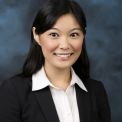The Langevin equation is widely used to model coarse-grained dynamics of soft and biological materials. However, it is not obvious for which systems and which processes the Langevin equation predicts a good approximation to the true dynamics. In this talk we will give an introduction to projection operator formalisms as a tool to systematically coarse-grain dynamics. We will show under which approximations the Langevin equation can be obtained from the dynamics of the underlying microscopic system and in which cases it makes sense to introduce a potential of mean force. We demonstrate the implications of our derivation for the structure of memory terms and for generalized fluctuation-dissipation relations. We show, in particular, that the widely used, simple structure which contains a potential of mean force, a memory term which is linear in the observable, and a fluctuating force which is related to the memory term by a fluctuation-dissipation relation, is neither exact nor can it, in general, be derived as a controlled approximation to the exact dynamics.
Events: Departmental/CSP Colloquia
-
The interplay between memory and potentials of mean force
-
From Monte Carlo to machine learning: how computational methods advance the study of statistical physics
In statistical physics, Monte Carlo methods have been an important computational techniques to study the thermodynamics and properties of matter. They use random sampling to generate a collection of physical states of a system, from which finite- temperature properties of materials can be calculated. The statistical analysis associated with Monte Carlo simulations naturally extends to the use of machine learning methods that have been rapidly advancing in recent years. Additionally, these two methods complement each other to facilitate new algorithms, capabilities, as well as applications to frontier research problems. In this colloquium, I will review the basic principles and developments of both Monte Carlo and machine learning methods, and highlight some of our current studies in condensed matter physics enabled by the combination of these two methods.
Bio:
Ying Wai Li has a Ph.D. in Computational Physics. She is a UGA Physics and Astronomy alumni, and is currently Deputy Team Leader of the Future Architectures and Applications Team at Los Alamos National Laboratory. Li’s research interests span condensed matter physics, algorithm design, and high-performance computing. Her expertise is in the state-of-the-art classical and parallel Monte Carlo algorithms, first principles methods, and recently the application of machine learning to computer simulations and data analytics for the study of thermodynamics and phase transitions of material properties. -
Advancing Scientific Discovery with Quantum Computing
Guest: Dr. Travis Humble, Quantum Computing Institute, Oak Ridge National Laboratory
Thursday, February 22, 2018 4:00 pm - 5:00 pm
Location: Physics Auditorium (202)Quantum computing promises new approaches to solving hard computational problems by using the principles of quantum mechanics. At ORNL, we are using these principles to solve scientific problems by taking advantage of recent developments in quantum computing hardware and software. I will present how we are developing algorithms for simulating quantum mechanical systems and applying them to application-specific problems in chemistry, nuclear physics, and applied mathematics. With these applications, we have developed a quantum computing ecosystem that highlights the interdisciplinary effort needed to translate scientific computing to the new hardware platforms. Alongside software applications and hardware infrastructure, I will also discuss how to measure performance in quantum computers, the challenges looming for near- term demonstrations, and the milestones expected on the way toward new scientific discoveries with quantum computing.
Biography:
Dr. Travis Humble is a Distinguished Scientist at Oak Ridge National Laboratory and director of the lab's Quantum Computing Institute. He oversees research and development of quantum computing technologies for ORNL and in 2016 received the prestigious Department of Energy Early Career Research Award. Travis holds a joint faculty appointment with the University of Tennessee Bredesen Center for Interdisciplinary Research and Graduate Education, where he works with students to develop energy-efficient computing.
-
Small is Different. Computational Microscopy and Emergence in the Nanos.
Guest: Prof. Uzi Landman, School of Physics, Georgia Institute of Technology
Thursday, February 23, 2017 4:00 pm - 5:00 pm
Location: Physics Auditorium (202)Finite materials systems of reduced sizes exhibit specific forms of aggregation, phases, structures and morphologies, quantized electronic shell structures, dimensionality cross-over, and size-dependent evolutionary patterns, which are manifested in unique, nonscalable, size-dependent physical and chemical properties. Indeed, when the dimensions of materials structures are reduced to the nanoscale, emergent phenomena often occurs, that are not commonly expected, or deduced, from knowledge gained at larger sizes. Discovery, characterization, understanding and possible utilization of such emergent behavior of materials in the nanoscale are among the major challenges of modern materials science. Progress in theses directions is greatly facilitated, or even predicated, by synthesis, fabrication, separation and measurements of atomically precise nanostructures, and by theoretical investigations of their unique structural, chemical and physical properties. Computer-based quantum computations, simulations and emulations, are tools of discovery which enable uncovering emergent behavior in the nanoscale. In this talk we employ such simulations, often in conjunction with laboratory experiments, to explore some of the origins that underlie the unique behavior of size-selected materials in the nanoscale, and highlight computational microscopy investigations of nanoscale phenomena in diverse systems, ranging from: nanoscale liquid jets and bridges, droplet electro-crystallization, nanoclusters and machine-like response of their self-assembled superlattices, to symmetry-breaking manifested in formation of highly-correlated Wigner molecules in electron quantum dots, and exact numerical emulations of many-body microscopic hamiltonians, suggesting the employment of finite ultracold fermionic atom systems in fundamental studies of quantum magnetism, entanglement, and high-Tc superconductivity.
-
The Aspirational Investor: A Physicist reflects on Financial Markets and Investing.
Guest: Dr. Ashvin Chhabra, President, Euclidean Capital
Thursday, April 28, 2016 3:30 pm
Location: Physics Auditorium (202)The great crash of 2008 brought the question of stability of the financial markets to the forefront. Are financial markets stable? Was the great crash of 2008 an unexpected aberration? How should individual investors invest over a lifetime? Why are otherwise smart people such lousy investors? What does Modern Portfolio Theory tell us about investing and where does it fail? Does Behavioral finance capture Investor mistakes correctly? The speaker will attempt to answer these questions from a Physicist’s viewpoint. This leads to a new framework for investing that extends modern portfolio theory to incorporate large deviations – such as bubble and crashes. The Colloquium will not assume prior knowledge of the subject matter and will be aimed at an audience of a variety of backgrounds.
Ashvin B. Chhabra is President of Euclidean Capital and manages the Endowment for the Simons Foundation. He was Chief Investment Officer of Merrill Lynch Wealth Management, one of the largest wealth management firms in the world, from 2013-2015 and Chief Investment Officer for the Institute for Advanced Study, Princeton prior to that. He is the author of the recently published book The Aspirational Investor. Dr. Chhabra received his M.S. in Physics from the University of Georgia and Ph.D. from Yale University in Applied Physics.
-
Application Opportunities and Challenges on the Titan Supercomputer: Accelerating the Path to the Exascale
Guest: Jack C. Wells, Director of Science, Oak Ridge Leadership Computing Facility, ORNL
Thursday, February 25, 2016 4:00 pm - 5:00 pm
Location: Physics Auditorium (202)Modeling and simulation with Petascale computing has supercharged the process of innovation, dramatically accelerating time-to-insight and time-to-discovery. The Titan supercomputer is the Department of Energy, Office of Science’s flagship Cray XK7 supercomputer managed by the Oak Ridge Leadership Computing Facility (OLCF). With its hybrid, accelerated architecture of traditional CPUs and graphics processing units (GPUs), Titan allows advanced scientific applications to reach speeds exceeding 20 petaflops with a marginal increase in electrical power demand over the previous generation leadership-class supercomputer. I will summarize the benefits, challenges, and lessons learned in deploying Titan and in preparing applications to move from conventional CPU architectures to a hybrid, accelerated architectures, and how the evolution of workloads on Titan is providing new opportunities for research in the areas of workflows and adaptive system schedulers. I will emphasize the challenges users have encountered with emerging programming models and how uses are addressing them using languages, libraries, and compiler-based solutions.
I also plan to discuss the science outcomes from Titan in diverse areas such as physics, materials sciences, nuclear energy, and engineering sciences. I will also discuss research outcomes from a growing number of industrial partnerships. We will discuss implications for the research community as we prepare for exascale computational science and engineering within the next decade. I will also provide an overview of user programs at the Oak Ridge Leadership Computing Facility with specific information how researchers may apply for allocations of computing resources.
Page 1 of 1, showing 6 records out of 6 total, starting on record 1, ending on 6



